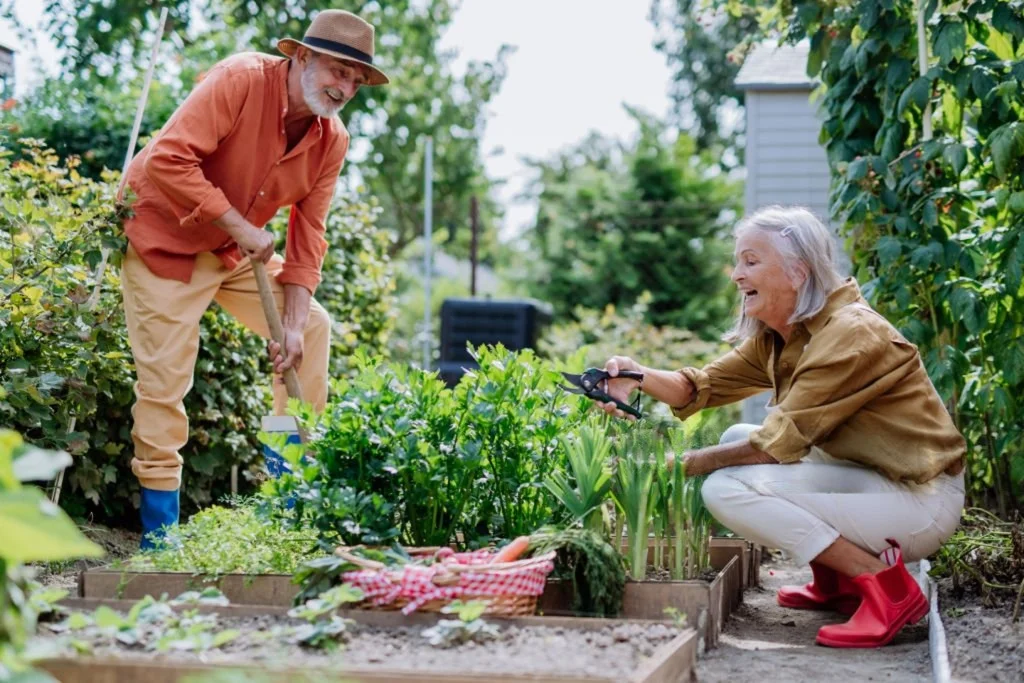The Benefits of Gardening for Senior Health and Happiness
Seniors gardening is not only a hobby but an effective intervention tool that encourages physical, mental and emotional health, particularly among seniors. The healthy lifestyle is increasingly needed, and these kinds of activities among the elderly elderly offer a unique mixture of physical activities, rest, and happiness. Planting in the elderly does not only involve nurturing health, happiness, and a sense of purpose but also gardening. In this paper, we take an overview of the multiple advantages of gardening among the elderly, the reason why gardening is the most suitable form of activity that should be conducted by the elderly and the means through which gardening among the seniors can be done safely and in an enjoyable way.
Physical Health Benefits of Gardening for Seniors
One of the most significant activities is staying physically active as a part of aging well. Senior gardening involves the mild exercise which is extremely natural to the seniors and renders them mobile and powerful. Digging, planting, watering and weeding might not be considered so intensive but it is a whole body exercise, which improves flexibility, balance and coordination.
Gardening activities may assist the seniors to keep physically fit and healthy in general:
- Increase muscle strength and tone of arms, legs and back.
- Improve the flexibility of joints, which can reduce stiffness and pain of arthritis.
- Moderate exercise promotes the wellness of the heart. Senior gardening related to cardiac rehab exercise can also be implemented at home among the seniors in order to advance heart health further.
- Be slim by burning low impact calories.
Seniors can also decrease the risk of falls through gardening and the elderly that is essential in the overall condition of health and independence. For additional guidance on fall prevention, seniors can refer to fall prevention interventions to make gardening for seniors and daily activities safer. Even light gardening for elderly people activities like trimming plants or watering flowers can contribute significantly to maintaining mobility.
Mental Health Benefits of Gardening
Gardening for seniors is an ideal activity, offering significant benefits for mental health and emotional well-being. Interaction with nature and plants has been scientifically proven to:
- Less stress and anxiety: These activities make it possible to reduce the level of cortisol, which causes stress and anxiety, and furthermore induce relaxation (outdoor activities, soil touch, and the cultivation of plants).
- Improve mood and happiness: With the help of endorphins and serotonin plants grow and bloom, which give the feeling of accomplishment and happiness.
- Enhance mental activity: Gardening among seniors activities such as landscape planning, watering routines and problem solving stimulates the brain allowing it to retain memory and concentration.
- Fight depression: Research studies have shown that elderly people who practice gardening and seniors who often engage in gardening have less depression than their peers who do not garden.
- Foster mindfulness: Senior citizens need to be mindful when gardening because it takes detail and attention to the present moment, which can help minimize overthinking and encourage mental clarity.
For seniors experiencing loneliness or social isolation, gardening and the elderly activities like community gardens or shared projects provide meaningful interaction, enhancing mental well-being further. Seniors can enjoy conversations, share gardening tips, and even participate in supportive programs such as speech therapy at home for adults to improve communication and social engagement, which contributes to overall happiness.
Emotional and Social Benefits
Plant care also makes the seniors feel a sense of responsibility and achievement, which may elevate self-esteem and emotional health. The daily gratification of seeing seeds growing and the flowering of flowers makes them overall happier.
Additionally, gardening acts as a therapeutic activity, helping seniors manage frustration, anger, and anxiety. The relaxing nature of planting, watering and pruning is also a way to promote mindfulness, allowing the elderly to be in the moment, instead of stressing about the past or upcoming time.
Another significant advantage is social interaction. The elderly who engage in elderly community project gardening or are members of a gardening club enjoy better social interaction thereby alleviating instances of isolation and loneliness. Giving tips, trading plants, or even having a chat in a garden can do wonders in the state of mind and heart.
Cognitive Benefits of Gardening
Gardening activities among seniors also favor the cognitive health. The brain is also engaged by activities such as planning a garden design, selecting plants and remembering watering timetables. The elderly frequently engaged in gardening and the elderly, regularly practising the same, can be experiencing:
- Higher level of memory and attention.
- Increased problem-solving and planning.
- Less risk of cognitive impairment and dementia.
Gardening with the aged awakens the senses, namely sight, smell, touch and even taste of the product, which also adds to the general mental alertness. Gardening provides seniors with a full-body and mind workout, combining physical exercise with mental stimulation.
Nutritional Benefits
Most of the elderly grows plant fruits, vegetables and herbs in their gardens, a factor that encourages healthy eating. Fresh fruits and vegetables grown at home are highly nutritious and encourage healthier eating habits. Through elderly gardening, the elderly persons will be more inclined to eat fresh fruits and vegetables, which will help:
-
Improved digestion and gut health
-
Stronger immune system
-
Better heart health
-
Higher energy levels and vitality
Use of fresh ingredients in the kitchen through cooking in a personal or communal garden also makes the seniors feel a sense of achievement and promotes creativity in the kitchen.
Tips for Safe Gardening for Seniors
Despite the numerous benefits that are associated with gardening amongst the seniors, the issue of safety must be put into consideration especially to the seniors who have mobility problem or those with health complication. Some of the safe gardening tips among the elderly persons include the following:
- Use raised garden beds to avoid excessive bending or kneeling.
- Use ergonomic tools with lightweight handles in order to minimize hand and wrist strain.
- To avoid injury and sunburn, wear gloves and sun protection.
- Always drink lots of water and rest frequently particularly when it is hot.
- Begin small so as not to get tired and slowly advance the challenges in gardening activities among the seniors.
- Indoors, potted plants can be considered or hydroponics, an option to be used by the seniors who have a limited mobility.
With these tips, gardening amongst the seniors can still be the safe, fun and fulfilling activity of all the seniors.
Why Gardening is a Perfect Hobby for Seniors
The specialty of gardening among the seniors is that, it is a blend of exercises, mind, emotion and social grouping among the seniors. Gardening among the older citizenry is flexible as compared to other forms of activity or hobby- it can be modified to suit their rates of capacities, mobility or space.
Two concepts that cannot be separated are gardening and the elderly whether it is attending a community garden, or working on the backyard or a small garden in the balcony. The elders would have an opportunity to enjoy the beauty of nature, grow favorite fruits and vegetables, and have a reason to live in the daily life.
Conclusion
In conclusion, gardening for seniors is more than a pastime it’s a lifestyle choice that enhances physical health, mental well-being, emotional happiness, and social engagement. By nurturing plants, seniors also nurture themselves, finding joy, relaxation, and purpose in the simple yet fulfilling act of gardening for seniors.
From enhancing mental health to encouraging physical activity, social engagement, and better nutrition, the benefits of gardening for seniors are extraordinary. Seniors looking to improve their quality of life should consider incorporating gardening for seniors into their daily routine it’s never too late to start and reap the many rewards.
FAQs
What is the best type of gardening for seniors?
Raised garden beds, container gardening, and indoor gardening are excellent options for seniors, especially those with limited mobility.
How does gardening for seniors improve mental health?
Gardening for seniors reduces stress, enhances mood, provides a sense of accomplishment, encourages mindfulness, and may help combat depression and anxiety.
Can gardening for elderly prevent cognitive decline?
Yes. Planning, planting, and maintaining a garden stimulates the brain, helping improve memory, attention, and problem-solving skills.
Is gardening for seniors safe for seniors with health conditions?
With precautions like ergonomic tools, gloves, sun protection, and taking breaks, gardening for seniors is safe and beneficial even for seniors with certain health conditions.
How often should seniors engage in gardening for seniors?
Even short daily sessions of 20–30 minutes can provide significant physical and mental health benefits.
What are the benefits of gardening on mental health?
Gardening for seniors helps reduce stress, improves mood, increases happiness, supports cognitive function, encourages mindfulness, and combats feelings of loneliness.


